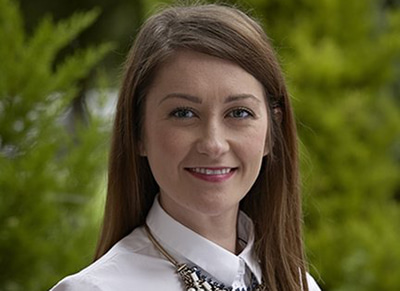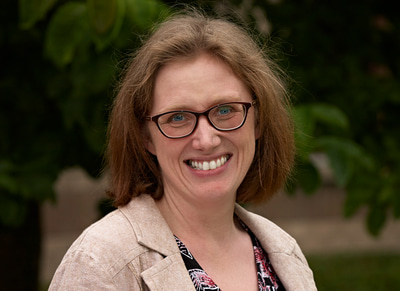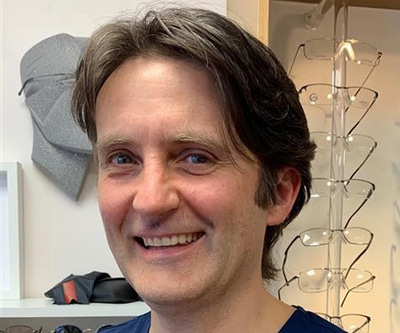- OT
- Life in practice
- Practitioner stories
- “The satisfaction from working with glaucoma patients is immense”
What I have learned
“The satisfaction from working with glaucoma patients is immense”
Lisa Cowan and Dr Louise Madden, leads for NHS Education for Scotland’s Glaucoma Award Training (NESGAT), and IP optometrist and student, David Cummins, discuss the new pilot course, the impact of COVID-19, and extending the remit of optometrists

23 May 2021
What led NHS Education for Scotland to develop the NES Glaucoma Award Training?
Dr Louise Madden NESGAT Lead (LM): In 2017, NHS Education for Scotland (NES) optometry programme directors, Lesley Rousselet and Kathy Morrison, reviewed postgraduate optometry courses for glaucoma care. At that point, the profession in Scotland had been developing their confidence working under the 2015 Scottish Intercollegiate Guidelines Network (SIGN) guideline 144 on glaucoma referral and safe discharge, and we had a rapidly growing number of independent prescribers (IP) keen to take on new challenges. Even then, we knew of the capacity challenges building in secondary care, and recognised the potential for patients to receive safe, effective and patient-centred care for their glaucoma and ocular hypertension (OHT) in the community.
What is the focus of the course and what do you aim to achieve?
LM: Ultimately, NESGAT supports the shift of appropriate eye care out of hospitals and into the community, by preparing optometrists to extend their remit. It is a valuable opportunity for role development; although we imagine for some taking on NESGAT it may be used to validate current delivery, such as our secondary care colleagues.It was a great benefit to have the Royal College of Ophthalmologists Common Clinical Competency Framework for glaucoma to align to, and also a great opportunity to rethink how we deliver placements for postgraduate qualifications, with the move to an outcomes-based focus.
How would you see this qualification, and increasing glaucoma care in the community in Scotland, benefiting both patients and secondary care?
LM: NESGAT provides an opportunity to build and strengthen links between primary and secondary care, supporting understanding and trust. It also quality assures the care patients will receive in the community, supporting service redesign. We hope it will support freeing up capacity in secondary care to see those with more complex glaucoma. Reducing waiting times for glaucoma appointments by increasing capacity is a big win right now, and for many cases, care will be provided closer to home than a standard hospital review appointment.NESGAT provides an opportunity to build and strengthen links between primary and secondary care
How do you think this approach fits into the future of community eye care?

Could you tell us what impact COVID-19 had on the course, in terms of the education delivery and clinical placements?
LC: The pilot year of the NESGAT programme began in February 2020, and as such has been largely overshadowed by COVID-19. The online learning content and discussions were relatively unaffected, but the NESGAT outcomes-based placements, due to begin in hospital glaucoma clinics in April 2020, were affected. We quickly worked to support outcomes being signed off via a mix of remote, simulation-based scenarios, some community shared care work, and come August, face-to-face clinics. These changes worked very well, so we have revised our online logbook to better support our 2021 cohort.One of the unexpected benefits of COVID-19 was that we introduced fortnightly online meetings to provide interaction and try to keep everyone motivated with studying over the summer, and this proved so successful that we are also planning to continue these in 2021.
Why might optometrists want to consider further qualifications, particularly in areas such as glaucoma care?
LC: There are many reasons for this, and the answers are probably different for each individual. This year’s cohort have enjoyed the challenge of learning more about glaucoma – it’s such a vast and complex topic and one of the things that’s come up time and time again is that there’s always more to learn, and that the learning will continue even after the course has been completed. In fact, NES have secured additional funding from the Scottish Government to develop a mentorship programme to support our NESGAT optometrists – a very exciting opportunity to ensure continued growth in confidence and competence.The ability to provide an enhanced service to patients is a real motivation, particularly as all the NESGAT optometrists are IP-qualified, and so have already been able to see the difference that having a prescribing qualification can make on their ability to care for their patients in the community.
What have you taken away from the first year of delivering the course?
LC: Flexibility has been hugely important – if we hadn’t been able to do this, it would have been impossible to deliver the programme successfully. We will continue to make changes, and to improve the programme in response to feedback from learners, whose enthusiasm and commitment has really been key to the success of the pilot year.
With the impact of COVID-19 on eye care services, we feel very proud to be supporting such significant redesign of how glaucoma care is delivered in Scotland, and of the practitioners taking on the challenge.
What made you apply for the qualification?

Have you completed any clinical placements as part of this, and if so, what has this experience been like?
DC: Yes, clinical placement was a mix of hospital and community-based glaucoma work. As a response to COVID-19-related capacity challenges, we have set up four community glaucoma clinics in Fife. In my main practice in Leven, I have seen six glaucoma patients every Friday afternoon for the last six months. Once I have completed a full examination on a dozen patients, I have an online meeting with the glaucoma consultant to confirm the management plan for each. This ‘decision support meeting’ is held over a shared desktop and provides a very powerful learning tool for a newbie glaucomatologist.
Specialist community glaucoma optometrists are a huge benefit to glaucoma patients by providing timely, high quality and accessible care
What have been the key takeaways you have gained from completing the course?
DC: The more you learn about glaucoma, the less you seem to actually know for sure. Glaucoma is complex and time-consuming, however the satisfaction from working with these patients is immense. Glaucoma care requires both attention to detail and the ability to step back and make a global judgement considering all the evidence - a very cerebral activity.
Could you tell us what you plan to do next?
DC: Continue the learning journey. I feel that I have only just started to learn about glaucoma, and I intend (funding permitting) to continue to host NHS glaucoma clinics in my practice and work towards a level of autonomy and expertise as I gain more experience.
What impact do you feel this qualification could have for enhancing and supporting services in the community?
DC: Specialist community glaucoma optometrists are a huge benefit to glaucoma patients by providing timely, high quality and accessible care. Most glaucoma patients we see in our glaucoma clinic are delighted to be seen locally. Community glaucoma clinics will also assist hospital glaucoma services prioritise those patients with the greatest risk of sight loss.
What would you say to an optometrist who might be considering further qualifications in glaucoma?
DC: Glaucoma is not a finite subject but if you want a challenge that just keeps on giving then glaucoma is for you. From a financial perspective, glaucoma care is never going to be a money-spinner but will certainly keep the grey cells ticking over and help the reputation of your practice.
Advertisement
More What I have learned
-
“We talk about preventative measures, which is key to protecting the eyes of the future”
-
“When I received the email to tell me that I could help with the vaccinations, it just felt right”
-
“Cultural awareness is a very important skill to have, especially in a profession such as optometry”
-
“Being able to get ideas from other contact lens educators is invaluable”


Comments (0)
You must be logged in to join the discussion. Log in